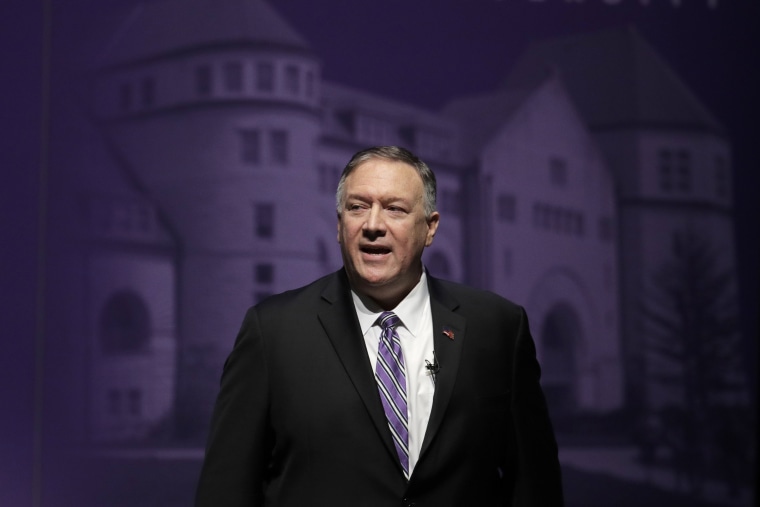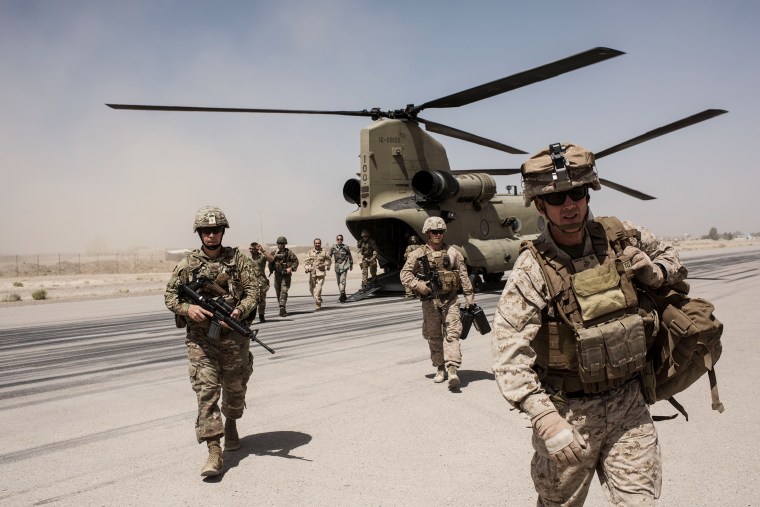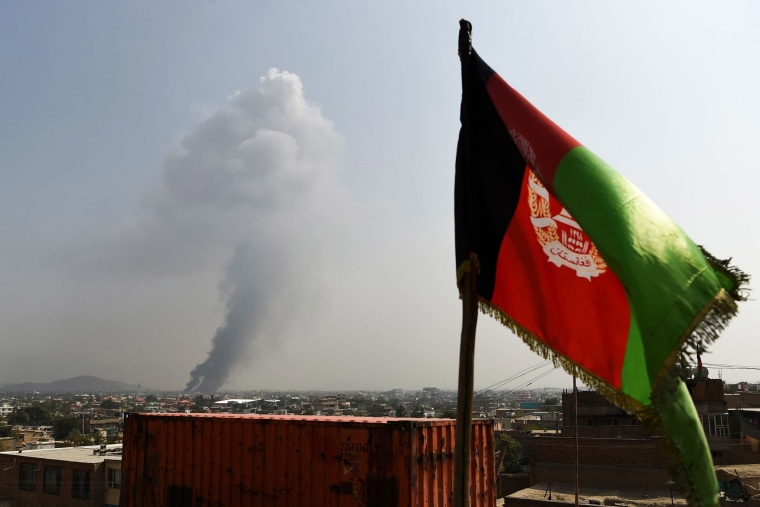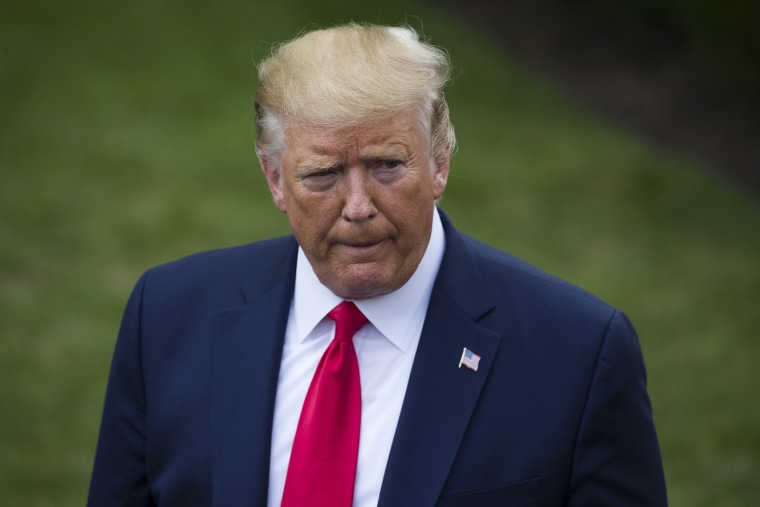WASHINGTON — President Donald Trump's abrupt cancellation of a proposed troop withdrawal deal with the Taliban will fuel more bloodshed in the 18-year-old war in Afghanistan and could wreck fragile prospects for peace, foreign diplomats, former U.S. officials and experts said Monday.
Trump's surprise decision over the weekend to cancel a draft agreement with the Taliban has dealt a serious blow to a nearly year-long diplomatic effort that had raised the possibility of ending the U.S. troop presence in Afghanistan and launching direct peace talks between the Taliban and the Afghan government for the first time since 2001.
"If they don't put the genie back in the bottle quite quickly, we will see a series of attacks," said one Western diplomat briefed on the diplomatic talks. "More Afghans will die. And probably more Americans as well."
Several foreign diplomats familiar with the U.S. negotiations, former U.S. officials who have worked on Afghanistan policy and regional analysts told NBC News they feared the fallout from Trump’s surprise tweets could jeopardize any chance for a diplomatic breakthrough and put more Afghan and American lives at risk.
The White House declined to comment.
The Taliban, meanwhile, issued what amounted to threats.
"Our position is far better than in the past," one Taliban commander, who declined to be quoted by name, told NBC News.
The insurgents had no shortage of finances, fighters, arms or ammunition, he said.
"Let's see who can win this war," he said.
Taliban fighters overseeing militants in the provinces of Farah, Kandahar and Helmand provinces said they plan to step up their operations against Afghan and U.S.-led forces now that Washington has suspended talks.
The Taliban believed they were on the verge of a deal that would have helped secure their long-sought goal of U.S. and NATO troops pulling out of Afghanistan, until Trump called off the agreement on Saturday.
Trump, who blindsided many officials inside his administration and foreign governments with his tweets, said he jad planned to host the Taliban and Afghan President Ashraf Ghani at the Camp David presidential retreat outside Washington to wrap up the deal. But he said a Taliban attack last week in Kabul that claimed the lives of civilians as well as an American service member prompted him to call off the meetings and scrap further talks with the Taliban.
Taliban said in a statement on Sunday that their representatives were not ready to travel to the United States unless the troop withdrawal agreement was signed and completed beforehand.
While Secretary of State Mike Pompeo on Sunday had left the door open to the possibility of resuming talks with the Taliban at some point, President Trump doubled down on his stance on Monday, telling a rally that the talks with the Taliban were "dead."

Now the Taliban, which was already gaining ground on the battlefield even before the talks with the Trump administration began in fall 2018, will have little incentive to offer any concessions or to hold back in targeting American or Afghan forces, experts said.
"Before the center of attention was Afghan troops and Afghan military personnel, but now we may see U.S. troops under the Taliban radar as well," said Umer Karim, a visiting fellow at the Royal United Services Institute, a London-based think tank.
The upcoming Afghan presidential election on Sept. 28 likely will result in more Taliban attacks, as in past elections, Karim and other experts said. The insurgents, who ruled Afghanistan from 1996-2001, reject polls organized by the current government, which they portray as a "puppet" of the United States.
Since last year, while the Taliban and the Trump administration engaged in painstaking bargaining sessions in the Qatari capital, the insurgents have sought to strengthen their negotiating hand with bloody bombings on civilian targets and assaults on provincial capitals. At the same time, U.S. forces have intensified an air war on the Taliban, with heavy bombing raids on insurgent fighters and fewer targeting restrictions from Washington.
While the Taliban vowed to expand their assault on the Kabul government, the breakdown in talks prompted Afghan President Ghani to harden his government's stance. In the past, the Afghan government had been prepared to enter into talks with the Taliban without conditions, but Ghani said Monday that "negotiation without a ceasefire is not possible."
"We are ready for peace talks but if the Taliban think they can scare us, look at these warriors," Ghani said at a gathering of military leaders.

Ghani's government, which was not invited to take part in the U.S.-Taliban talks in Doha, had harbored fears about Washington's approach to the discussions, expressing concerns that the Trump administration was giving up its leverage without getting much in return from the Taliban. As NBC News reported Ghani clashed with Trump's special envoy, Amb. Zalmay Khalilzad, last week when the U.S. negotiator briefed the Afghan government on the details of the proposed deal.
Trump's tweet storm also undermined Washington's credibility with allies and other partners that had been enlisted to help push the talks ahead, including Norway which had started preparations to host the planned peace negotiations between the Taliban and Afghan representatives, said Laurel Miller, a former senior U.S. diplomat who has followed the discussions closely.
"To mount a diplomatic initiative like this requires the support of a lot of different governments. It's not a one country show even if the U.S. is the central player," said Miller, now the director of the International Crisis Group's Asia program.

"Khalilzad has done a lot to build up faith in the U.S. commitment to negotiations, including in Pakistan. This certainly undercuts that."
It was unclear if President Trump will go ahead with a partial troop withdrawal that had been presented as part of the draft deal with the Taliban. And some former U.S. officials and Western diplomats worried that Trump might opt to unilaterally pull the plug on the entire mission, as he has suggested he might do in the past.
If Trump changes his mind, which he has on other diplomatic gambits, and restarts the talks with the Taliban, the United States will be playing a weaker hand, and its promises will be in doubt, experts said.
But time is short, and if the White House doesn't take action soon, the whole diplomatic project could collapse for good, said Johnny Walsh, a former diplomat who took part in previous talks with the Taliban under the Obama administration.
"If there isn't a serious effort in the coming days and weeks to revive what was agreed, past precedent suggests it could be quite a while before the talks start again," said Walsh, now at the U.S. Institute for Peace think tank.
Barnett Rubin, an academic who played a prominent role in the previous administration's overtures to the Taliban, has spoken out in support of Amb. Khalilzad's months-long bid to broker a deal with the Taliban as a first step to peace. But he said Trump's behavior over the weekend was reckless and could mean no peace effort could work as long as he was in office.
"My tentative suggestions: whatever just happened, it's about Trump, not Afghanistan. He wanted a photo op and a high-ratings TV show, and when it didn't work out, he canceled it," Rubin tweeted.
"In all likelihood, no peace process anywhere requiring the involvement of the U.S. can succeed while Trump is president. Plan accordingly."
